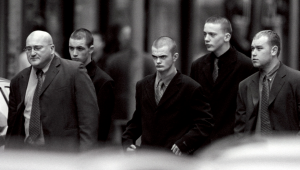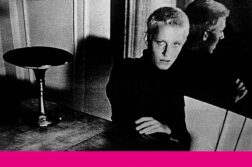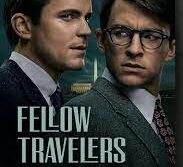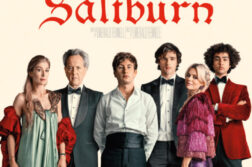SUNDANCE is undoubtedly the most GLBT-friendly of the major international film festivals. This is true not only because of the large number of gay-themed films on display, but also because the people that attend Sundance are there because they love good films and couldn’t care less whether a film is “gay” by virtue of its content, its target audience, or its director’s sexual orientation. This concentration on the films was in overdrive this year, as even the parties were substandard (including the one at the Queer Lounge, whose new location proved a disadvantage).
On to the films, then: I counted seventeen that had significant GLBT content, and many of these were among those that captured the buzz at the Festival. The following capsule reviews cover a half-dozen films that have a good shot at appearing at an art cinema or film festival near you.
An American Crime. One of the best features at this year’s festival, out director Tommy O’Haver’s film chronicles a story about mass conformity that would give Shirley Jackson’s The Lottery a run for its money. Only this story is based on fact. The year is 1965, the place is Indiana, and two teenage sisters are left in the care of Gertrude Baniszewski, a woman already working hard, raising seven children, and drinking heavily. Before long, rumors start flying about the girls being imprisoned in the basement, the truth is denied, and one of the girls ends up dead. O’Haver’s restrained treatment of the girls’ three-month ordeal should mute any cries of sensationalism. To tell his horrific tale, O’Haver comes up with a decidedly un-Hollywood narrative device that explores the filmmaker’s responsibility to be faithful to tragic events of the past. However interesting, this beyond-the-grave meta-narrative finally detracts from what would otherwise be a near masterpiece.
The Last Dining Table. In a festival year known for its selection of depressing films based on real events, writer-director Gyeong-Tah Roh takes the cake when it comes to a depressing imagination. Fostered by an ambivalent regard for technology à la Don Delillo and punctuated by a pessimistic sense of humor reminiscent of Kurt Vonnegut, this film chronicles the miserable lives of South Koreans, regardless of age, gender, economic background or sexual orientation. Rarely has a portrayal of “progress” made it so barbaric.
Longford. In a festival of downers, ubiquitous writer Peter Morgan (The Queen, Last King of Scotland) and director Tom Hooper’s film was a happy treat. Inspired by true events, Frank Aungier Packerham, the Earl of Longford, was an unconventional politician who shocked his country by actually acting like the Christian he professed to be. “The outcast’s outcast,” Longford was a devout Catholic who regularly visited the incarcerated and the deplored. In the 1960’s his faith was put to the test when he started visiting Myra Hindly, a person who instilled the same kind of loathing in the UK that Charles Manson would a few years later across the Pond. Riveting with topnotch acting, Longford will appear on HBO this month. The film mildly alludes to a brief lesbian affair.
Smiley Face. Those who loved Gregg Araki’s Sundance Film Festival standout of a few years ago, Mysterious Skin, may be sorely disappointed with his latest venture. Coming off the cusp of his most accomplished film to date, Araki’s latest tale involves a baked bubblehead blonde, Jane, who remains stoned for the duration of this 88-minute movie. Mediocre comedies usually include a vignette or two about some dude or dudettte so wasted he or she cannot see straight—which is rarely funny—but a whole movie of this? Perhaps it will be amusing to a new pot smoker or a PG-13 filmgoer.

A Very British Gangster. Dominic Noonan, a.k.a. lattlay fottfoy (“Look after those that look after you; fuck off those that fuck off you”), has been bisexual for most of his life, but now prefers the company of men. But you better not call him a “poof”; that is, if you want your head to remain in the vicinity of your shoulders. The patriarch of one of the most ruthless organized crime families in Manchester, England, Noonan robs, steals, or whatever else it takes to maintain his power, including some “proper torturing” of those lads who raped him in his youth. However, since the Irish Noonan fulfills a need that official structures such as the police or government do not, the entire proletarian and doleful milieu he serves and protects sees right past his sexual orientation. Shot with incredible intimacy by journalist Donal Mac Intyre, this is a film that deconstructs stereotypes.
Weapons. An extraordinary achievement in filmmaking that had audiences strongly divided, Adam Bhala Lough’s film starts off with one of the most unforgettable opening scenes of the past five years and then roars the rest the way. A tale of revenge that includes rape, guns, basketball, and way too much partying, this is a work of art marked by smart storytelling, strong performances, crazy comedic moments, and brilliant music by DJ Screw. Weapons interlocks stories about trashy kids experimenting in violence, drugs, and sex, including girls kissing girls. This film was picked up by a distributor at Sundance.





